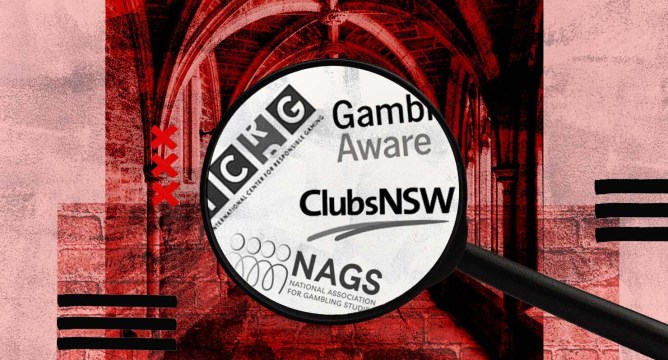This article is an instalment in a new series, Punted, on the government’s failure to reform gambling advertising.
There are different schools of thought about how to perfect casino design in ways that will disorient and mesmerise people into staying longer and spending more.
Initially the seminal thinker was Bill Friedman, a former gambling addict who put his first-hand expertise and 20 years of research into Designing Casinos to Dominate the Competition, first published in 2000, which set the template for many years. The rules his book outlines make for a depressing read: no clocks or windows so people lose track of time; no décor but the machines to monopolise attention; labyrinth-like corridors to disorient gamblers as soon as they arrive.
“You have to suck them in right away,” he told The New Yorker in 2012. “And then, once you get them, you have to make it hard to leave.”
Then there was interior designer Roger Thomas, whose designs shifted to a kind of ersatz opulence, an “adult playground” whose sense of refuge from reality acted as a palliative for the inevitable gambling losses.
Both approaches raked in hundreds of millions of dollars. And that’s before you get to how the games themselves are designed.
Now, with the ubiquity of online gambling, everyone has a potential casino or bookmaker in their pocket.
“The mechanism of addiction is the same, whether it’s poker machines or online gambling,” Associate Professor at the School of Public Health and Preventive Medicine at Monash University Charles Livingstone told Crikey.
“The online bookies have developed characteristics in their products which are extremely similar to gambling that’s not online — for example what we call the event frequency is now so high in online gambling that it is approaching that of slot machines and pokies.”
Research has consistently found that games with higher event frequencies are attractive to problem gamblers and are more likely to lead to negative gambling outcomes, such as difficulty quitting the game and higher losses.
Livingstone said that online sports betting — allowing multiple bets on multiple games happening at the same time as well as events within single games — means gamblers “can now set up a whole host of events that you can bet on, which you bet on with enormous frequency”.
“So you’ve achieved this high event frequency, which engages people in what we call high immersion,” he said. “People that are highly immersed in the game tend to lose what’s called executive function, that is, they get lost in the product. And once they’re lost in the product, it’s very difficult for them to find their way out of it.”
Which is all the more worrying when considering the explosion of gambling advertising in recent years — and the Australian Labor Party’s apparent reluctance to ban it.
Associate Professor Shalini Arunogiri, acting director of addiction treatment at research organisation Turning Point, told Crikey the current levels of gambling advertising across commercial television and social media were “unprecedented”.
“There’s not a generation before that has had this exposure to this level of marketing,” she said.
Arunogiri said the saturation of gambling advertising experienced by young people was of particular concern; Turning Point’s submission to the parliamentary inquiry into online gambling harm cited research that found “three quarters of children aged 8 to 16 are able to name at least one sports betting brand … and 75% of children perceive sports betting as a normal part of sport”.
“It’s not just adults being exposed to this, but we know that young people and adolescents are really exposed to gambling related advertising, both on social media as well as around watching sports,” she said. “And so that normalisation is really problematic.”
And the risks around losing executive function — the ability to think through a decision and not act impulsively — are even higher for young people.
“We know that [early adolescence] is a really vulnerable period for kids — the ability to actually resist these impulses is still developing at that age,” Arunogiri said. “And we know from longer-term studies that childhood experiences of gambling are likely to lead to much higher rates of gambling-related harm when people grow up.”
Anyone affected by problem gambling can get immediate assistance by calling the National Gambling Helpline on 1800 858 858 for free, professional and confidential support 24 hours a day, seven days a week.
